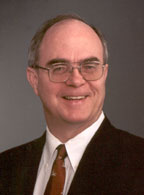A UNMC oncologist, James Armitage, M.D., the Joe Shapiro Professor of Medicine in the oncology/hematology section, wrote an editorial for the March 24 edition of the New England Journal of Medicine.
Considered one of the leading experts in the world in lymphomas, Dr. Armitage was asked to review a French study which found that an aggressive form of lymphoma responds better to high-dose chemotherapy than standard drug and radiation therapy, when the cancer hasn’t spread.
 |
James Armitage, M.D. |
In his editorial, Dr. Armitage noted that there is a great deal of variability in lymphomas. He concluded the editorial by writing: “Physicians who treat patients with lymphomas hope that we will continue to move away from the ‘one-size-fits-all’ approach to the management of aggressive lymphomas.”
“Being asked to write an editorial for the New England Journal of Medicine is quite an honor,” said Ken Cowan, M.D., Ph.D., director of the UNMC Eppley Cancer Center. “It’s a tribute to the long, outstanding success of the lymphoma program at UNMC and demonstrates that UNMC is at the forefront of cutting edge research to better understand the biology of lymphoma. Dr. Armitage and the entire lymphoma team at UNMC are recognized around the world for their expertise.”
Julie Vose, M.D., professor and chief of the oncology/hematology section, said there are several exciting initiatives currently underway in UNMC’s lymphoma program.
“We are studying several new chemotherapy drugs, as well as looking at monoclonal antibodies, radiolabeled antibodies and vaccines in the treatment of lymphomas,” she said. “UNMC also is leading an international study to reclassify T-cell lymphomas and evaluate their clinical outcomes.”
She added that UNMC continues to do gene expression analysis using microarray technology for lymphoma patients. A research group led by pathology/microbiology professor John Chan, M.D., is performing this analysis work. “This allows us to provide a more accurate prognosis for lymphoma patients and better treat the disease by using drugs that will work best with the abnormal genes that are identified,” she said. In the future, the gene expression analysis will allow identification of the specific abnormalities in a patient’s lymphoma, which will direct more personalized therapeutic options for patients with non-Hodgkin’s lymphoma, Dr. Vose said.
Having a UNMC faculty member asked to write an editorial for the New England Journal of Medicine is nothing new. In recent years, several faculty have written editorials for the journal. A partial list of other editorial contributors and their topics have included:
- Dr. Vose, on stem cell transplantation for non-Hodgkin’s lymphoma;
- John Gollan, M.D., Ph.D., dean of the UNMC College of Medicine, and Mark Mailliard, M.D., associate professor, internal medicine, on hepatitis B;
- Michael Sorrell, M.D., professor, internal medicine, and Dan Schafer, M.D., professor, internal medicine, on liver disease;
- James O’Dell, M.D., professor, internal medicine, and chief of the section of rheumatology, on rheumatoid arthritis; and
- William Haire, M.D., professor, internal medicine, on blood clots. Dr. Haire has been asked twice to write editorials for the New England Journal of Medicine.